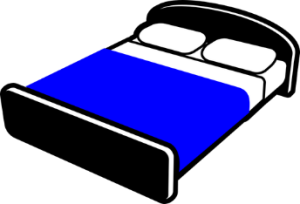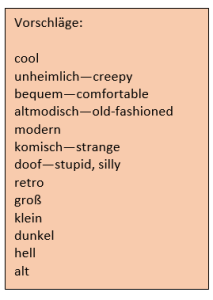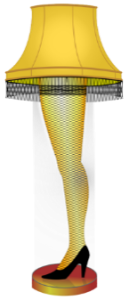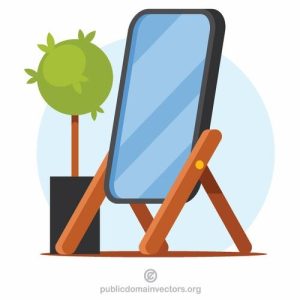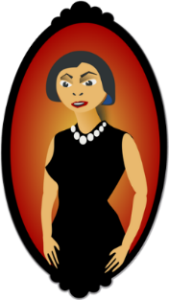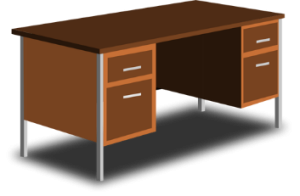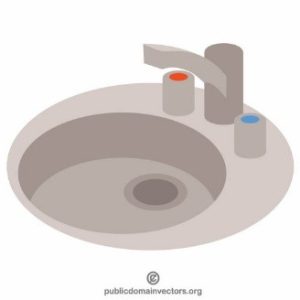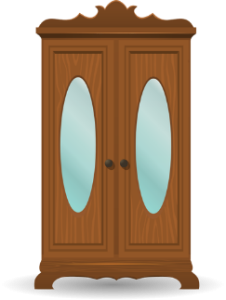7 Section 4-7
4.7: Dative Verbs
In Chapter 2, you learned that direct objects are put into the accusative case.
Beispiel: Erika findet den Film doof. („Film“ is accusative)
Some verbs, however, take dative objects. After these verbs, we use the dative case instead of using the accusative case as we normally do.
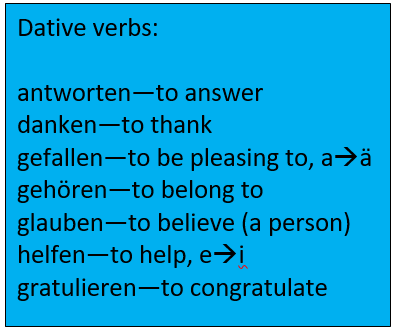 Since the dative case is the “to the” case, it might help to re-define dative verbs so that they have the word “to” in their definitions.
Since the dative case is the “to the” case, it might help to re-define dative verbs so that they have the word “to” in their definitions.
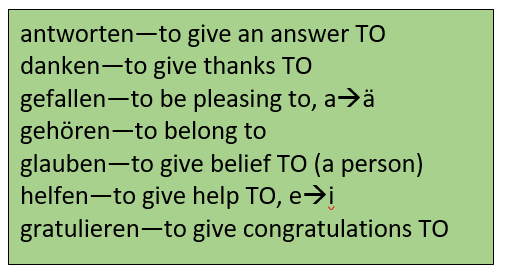
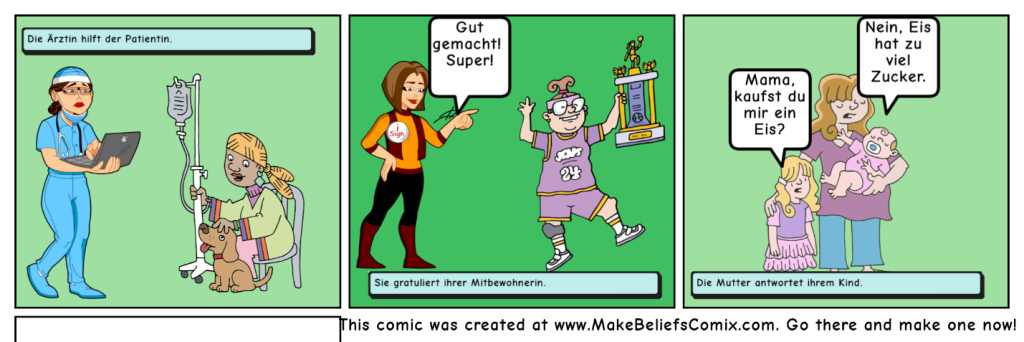
These aren’t the only dative verbs in the entire German language, but they are some of the most common ones.
Der Arzt hilft dem Kind.
(Das Kind is neuter. Since helfen is a dative verb, we put the object into the dative case, i.e. das Kind→dem Kind.)
Du hast eine Million Euro? Ich glaube dir nicht!
(We use the dative pronoun dir instead of dich because glauben is a dative verb.)
Ich danke meiner Oma für meinen neuen Pulli.
(Meine Oma is feminine. Since danken is a dative verb, we put the object into the dative case, i.e. meine Oma→meiner Oma.)
Der Student antwortet dem Professor.
(Der Professor is masculine. Since antworten is a dative verb, we put the object into the dative case, i.e. der Professor→dem Professor.)

Click to see me reteaching dative verbs:
Ex. A: Verben mit Dativ. It helps to be able to identify dative verbs. Which of the following are dative verbs?
- machen
- danken
- gefallen
- bekommen
- sitzen
- antworten
- gratulieren
- fragen
- verkaufen
- lesen
- gehören
- helfen
- studieren
- glauben
- nehmen
Ex. B: Verben mit Dativ, II.
Beispiel: Ich antworte __________ Frau.
→ Ich antworte der Frau.
(The verb “antworten” is a dative verb; therefore, we use the dative case for “Frau.”)
- Dieses Buch gehört _________ Studentin.
a. den b. dem c. die d. der
2. Diese Universität gefällt _________.
a. mich b. mir
3. Kannst du __________ Mann helfen?
a. der b. die c. dem d. den
4. Du hilfst mir! Ich danke _________.
a. dich b. dir
5. Er sagt, er hat eine Million Euro im Lotto gewonnen. Ich glaube _______ nicht.
a. ihm b. ihn
6. -Ich habe einen neuen Job! -Ich gratuliere ______.
a. dich b. dir
7. Sagst du ja oder nein? Du musst ________ Mann antworten.
a. der b. dem c. den d. die
8. Kannst du mein____ Freund helfen?
a. -er b. -em c. -en d. -es
9. Die schöne Lampe gehört mein____ Mutter.
a. -em b. -er c. -es d. -en
Watch Easy German’s video to see lots of examples with the dative case.
Dative Verb: gefallen—to be pleasing to
You already know how to say that you like something by using the modal verb mögen.
Ich mag klassische Musik.
Meine Eltern mögen lieber Jazz.
The verb gefallen means the same thing. You can use it to say what you like or what is pleasing to you.
Klassische Musik gefällt mir.
(Classical music is pleasing TO me.)
OR
(I like classical music.)
Jazz gefällt ihnen.
(Jazz is pleasing TO them.)
OR
(They like jazz.)
Notice that we ended up using a dative pronoun in these examples.
Klassische Musik gefällt mir.
Jazz gefällt ihnen.

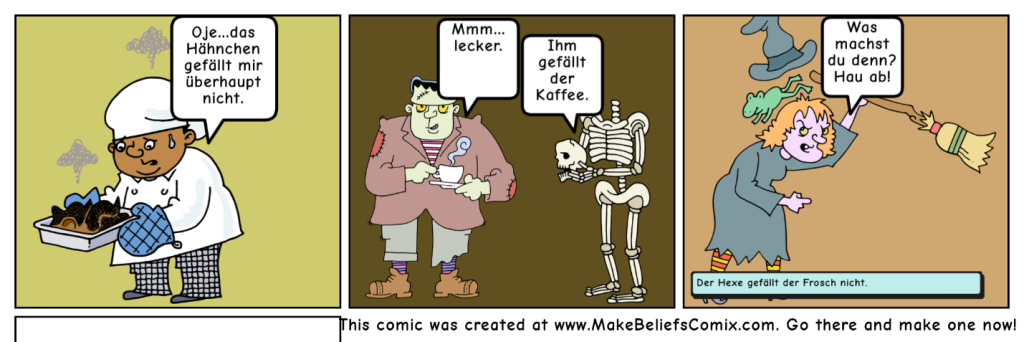
The thing liked ends up being the subject instead of the direct object.
You will probably only end up conjugating this verb for the third person singular and plural. Note that gefallen is a stem-changing verb, a→ä. Remember that stem-changing verbs only change at the du and er/sie/es form.
SINGULAR: Das Buch gefällt mir. (I like the book.)
ABER
PLURAL: Die Bücher gefallen mir. (I like the books.)
Sometimes you will hear the subject and direct object switched, but the verb will always stay in 2nd position.
SINGULAR: Mir gefällt das Buch.
PLURAL: Mir gefallen die Bücher.
FRAGE: Is one more correct than the other?
ANTWORT: No. It is just a different way to express it. As long as you keep the verb 2nd, everything will be fine.
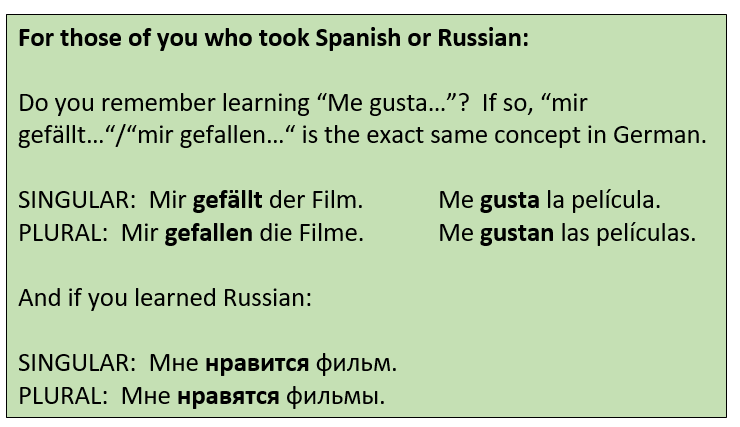
Watch Super German’s video to see more examples with gefallen.
Ex. C: Was gefällt Ihnen? Sie gehen mit Ihrem Mitbewohner/Ihrer Mitbewohnerin einkaufen. Drücken Sie Ihre Meinung über die folgenden Möbelstücke aus.
Beispiel: 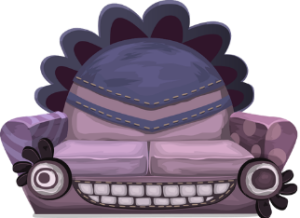
A: Gefällt dir das Sofa?
B: Ja, es gefällt mir. Es ist cool!
ODER
B: Nein, es gefällt mir nicht. Es ist zu unheimlich.
Ex. D: Was gefällt Ihnen an Ihrer Stadt? Was gefällt Ihnen nicht?
Singular: Mir gefällt _______________ (nicht).
Plural: Mir gefallen ______________ (nicht).
Vorschläge: der Park, die Leute, die Restaurants, die Universität, etc.
Ex. D: Welche Fächer gefallen dir? Sprechen Sie mit Ihren Mitstudenten/Mitstudentinnen. Welche Fächer gefallen ihnen? Welche nicht? Seien Sie kreativ!
Beispiel: Mathematik
A: Gefällt dir Mathematik?
B: Ja, Mathe gefällt mir. (Mir gefällt Mathe.)
ODER
B: Nein, Mathe gefällt mir nicht.
A: Warum?
B: Ich finde Mathe total logisch!
ODER
B: Ich finde Mathe zu langweilig.
Fächer: Mathe, Englisch, Chemie, Geschichte, Kunst, Musik, Spanisch, Deutsch, Psychologie…usw.
Ex. E: Was gefällt dieser Person? Using the cues below, write sentences to describe what the following people like or do not like.
Beispiel: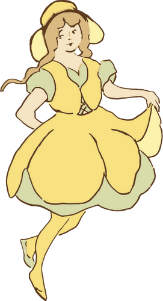


→ Ihr gefällt der Fluss.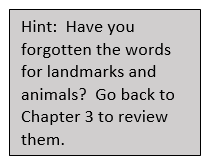
ODER
Ihr gefällt das Land.
The Dative Verb gehören—to belong to
The verb gehören works almost exactly like the verb gefallen. Furthermore, it is a lot like the English equivalent when you form sentences.
Das Wörterbuch gehört mir.
(The dictionary belongs to me.)
We even use the word “to” in English to show possession in this example.
Pointers:
- The thing that belongs to you is the subject AND determines how to conjugate the verb, i.e. whether it is singular or plural.
a. Singular: Der Hund gehört mir.
b. Plural: Die Hunde gehören mir.
2. Word order CAN be switched as it was with gefallen. As long as the verb stays in second position, it is fine.
Mir gehört das Wörterbuch.
ODER
Das Wörterbuch gehört mir.
- Use the dative case endings or pronouns to say WHOM the thing or things belong TO.
- Mir gehört der Roman. (pronoun)
- Der Anzug gehört dem Mann. (masculine noun)
- Die Pizza gehört meinem Kind. (neuter noun)
- Diese Jeans gehört deiner Freundin. (feminine noun)
- Der Fernseher gehört den Kindern. (plural noun)

Watch YourGermanTeacher’s video to see him reteaching how to use the verbs gefallen and gehören:
Ex. F: Was gehört wem? Look around you. What belongs to whom?
Beispiel: Diese Tasche gehört mir. Dieses Buch gehört ihm.
ODER
Mir gehört die Tasche. Ihm gehört dieses Buch.
Ex. G: Das gehört der Studentin. What belongs to whom? Using the cues, make sentences.
Beispiel: mein Mitbewohner 
→Die Lampe gehört meinem Mitbewohner.
- meine Mitbewohnerin

- mein Freund

- deine Freundin
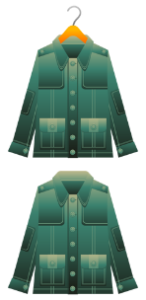
- dein Professor
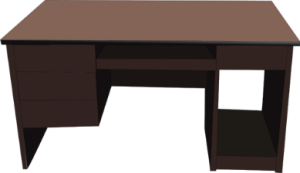
- eure Professorin

- der Verkäufer

- die Kundin

Ex. H: Wie helfen Sie anderen? Are you helpful? Whom do you help? Broadcast your good deeds to the entire class! Don’t forget that helfen is a dative verb and will take a dative object.
Beispiel: Ich helfe meiner Oma. Ich wasche ihr Auto.
Ex. I: Nicos Weg. Episode 38: Mein Beruf. Watch episode 38 and do the online activities. You will review modal verbs können and müssen.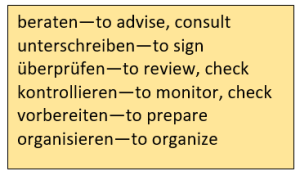
https://learngerman.dw.com/en/mein-beruf/l-37475138
Ex. J: Nicos Weg. Episode 39: Wo ist der Aufzug? Watch episode 39 and do the online activities. You will learn a few new prepositions, but we won’t officially do much with them in this book until Chapter 6. For now, just use the dative case after them.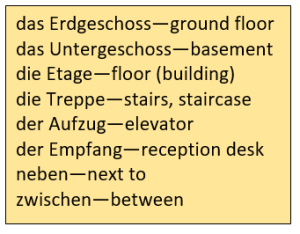
https://learngerman.dw.com/en/wo-ist-der-aufzug/l-37476734

